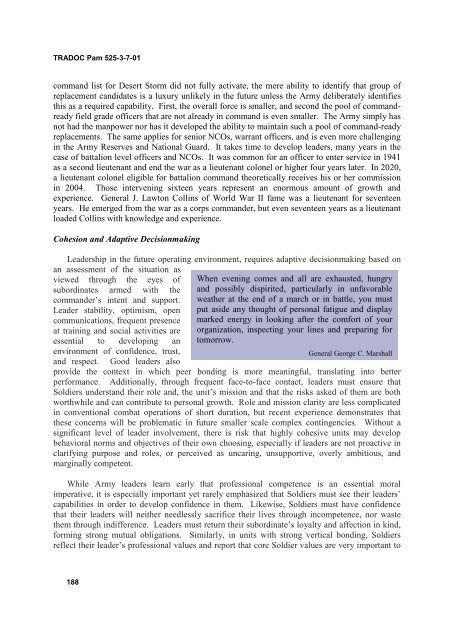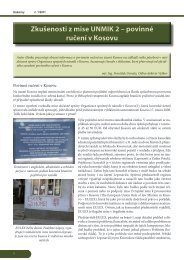TRADOC Pam 525-3-7-01 - TRADOC - U.S. Army
TRADOC Pam 525-3-7-01 - TRADOC - U.S. Army
TRADOC Pam 525-3-7-01 - TRADOC - U.S. Army
- No tags were found...
Create successful ePaper yourself
Turn your PDF publications into a flip-book with our unique Google optimized e-Paper software.
<strong>TRADOC</strong> <strong>Pam</strong> <strong>525</strong>-3-7-<strong>01</strong>command list for Desert Storm did not fully activate, the mere ability to identify that group ofreplacement candidates is a luxury unlikely in the future unless the <strong>Army</strong> deliberately identifiesthis as a required capability. First, the overall force is smaller, and second the pool of commandreadyfield grade officers that are not already in command is even smaller. The <strong>Army</strong> simply hasnot had the manpower nor has it developed the ability to maintain such a pool of command-readyreplacements. The same applies for senior NCOs, warrant officers, and is even more challengingin the <strong>Army</strong> Reserves and National Guard. It takes time to develop leaders, many years in thecase of battalion level officers and NCOs. It was common for an officer to enter service in 1941as a second lieutenant and end the war as a lieutenant colonel or higher four years later. In 2020,a lieutenant colonel eligible for battalion command theoretically receives his or her commissionin 2004. Those intervening sixteen years represent an enormous amount of growth andexperience. General J. Lawton Collins of World War II fame was a lieutenant for seventeenyears. He emerged from the war as a corps commander, but even seventeen years as a lieutenantloaded Collins with knowledge and experience.Cohesion and Adaptive DecisionmakingLeadership in the future operating environment, requires adaptive decisionmaking based onan assessment of the situation asviewed through the eyes of When evening comes and all are exhausted, hungrysubordinates armed with the and possibly dispirited, particularly in unfavorablecommander’s intent and support.Leader stability, optimism, opencommunications, frequent presenceat training and social activities areweather at the end of a march or in battle, you mustput aside any thought of personal fatigue and displaymarked energy in looking after the comfort of yourorganization, inspecting your lines and preparing foressential to developing an tomorrow.environment of confidence, trust,and respect. Good leaders alsoGeneral George C. Marshallprovide the context in which peer bonding is more meaningful, translating into betterperformance. Additionally, through frequent face-to-face contact, leaders must ensure thatSoldiers understand their role and, the unit’s mission and that the risks asked of them are bothworthwhile and can contribute to personal growth. Role and mission clarity are less complicatedin conventional combat operations of short duration, but recent experience demonstrates thatthese concerns will be problematic in future smaller scale complex contingencies. Without asignificant level of leader involvement, there is risk that highly cohesive units may developbehavioral norms and objectives of their own choosing, especially if leaders are not proactive inclarifying purpose and roles, or perceived as uncaring, unsupportive, overly ambitious, andmarginally competent.While <strong>Army</strong> leaders learn early that professional competence is an essential moralimperative, it is especially important yet rarely emphasized that Soldiers must see their leaders’capabilities in order to develop confidence in them. Likewise, Soldiers must have confidencethat their leaders will neither needlessly sacrifice their lives through incompetence, nor wastethem through indifference. Leaders must return their subordinate’s loyalty and affection in kind,forming strong mutual obligations. Similarly, in units with strong vertical bonding, Soldiersreflect their leader’s professional values and report that core Soldier values are very important to188



